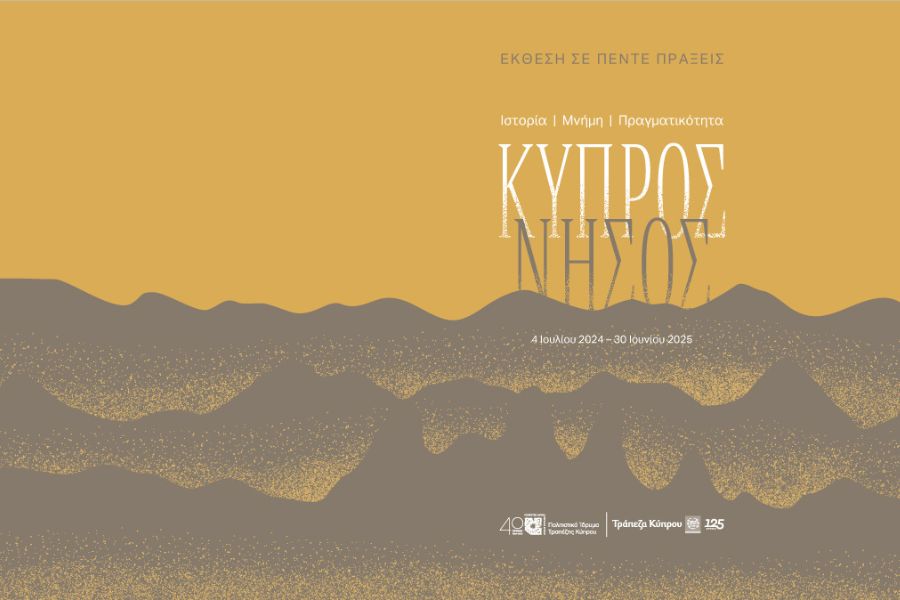History-Memory-Reality, 4 July 2024 - 30 July 2025

An exhibition in five acts, on the occasion of the 50th anniversary of the Turkish invasion of Cyprus.
The exhibition Cyprus Insula History – Memory – Reality captures life in Cyprus from antiquity to the present day, conveying the unwavering message of the entirety of the insularity of Cyprus, in a contemporary and interactive way.
Curated by Dr. Yiannis Toumazis and Demetra Ignatiou, the exhibition examines the historically unified cultural character of Cyprus, which combines elements from the island’s rich, complex and multifaceted historical past.
Centred around the notions of time, place and people, the exhibition fosters associations and narratives, showcasing aspects of the history and contemporary reality of Cyprus that have contributed to the forging of its inherent insular identity.
Opening hours: Monday-Sunday 10:00-19:00
-
In addition, it brings to the fore continuities and discontinuities –sometimes dominating and other times eluding historical memory– which emerge and are assimilated over time in the historical trajectory of Cyprus.
The exhibition takes its name from Codex 655, Ptolemy’s Geography (late 13th–early 14th century), which features the earliest known cartographic depiction of Cyprus, by Claudius Ptolemy in the 2nd century AD. This valuable exhibit, presented for the first time in Cyprus, has been kindly made available for the exhibition by the Holy Great Monastery of Vatopedi at Mount Athos.
Part of the exhibition is dedicated to the “difficult years” of the Republic of Cyprus, from 1963–1964 to the tragic aftermath of the Turkish invasion in 1974. Through a specially designed immersive experience, viewers will have the opportunity to become acquainted with defining events of the recent history of Cyprus.
Modern and interactive technologies have been used for the design and presentation of the exhibition. Material from the Bank of Cyprus Cultural Foundation’s collections, as well as selected exhibits from significant public and private collections, are combined to create compelling narratives and itineraries, with the aim of targeting all ages. Featured exhibits include antiquities, folk art, contemporary artworks, historical maps, rare publications, manuscripts and engravings, printed and digital archival material, and digital applications.
For the digital and interactive applications, the Cultural Foundation has collaborated with the CYENS Centre of Excellence, the Cyprus Institute, the Harokopio University of Athens, the Sylvia Ioannou Foundation, cloudy.works, Stathis Mitsios, Eleftheria Kalpenidou, Stavroula Gregoriou, Maria Leonidou and Rebecca Stylianou.
Cyprus Insula points to the Foundation’s new identity, which aims to showcase its rich collections through innovative museological and museographic approaches and at making its archive accessible to the general public.
The exhibition, which will run from 4 July 2024 to 30 June 2025, will be open daily 10:00–19:00 at the Bank of Cyprus Cultural Foundation in the old town of Nicosia. The Agora, the museum shop, will reopen, offering items inspired by the Foundation’s collections, as well as the Cyprus Insula exhibition.
The exhibition will be accompanied by a relevant publication, as well as parallel actions and events that will be directly related to the exhibition’s theme, such as:
- Roundtable Discussions
- Experiential and Educational programmes
- Lectures, Guided Tours, Presentations
- Specially designed activities based on the multi-sensory museum experience “Aisthiseis” (Senses) of the BoC Cultural Foundation for vulnerable groups
In addition to the collections of the Cultural Foundation, exhibits were also kindly provided by the following:
- G. Leventis Gallery
- Achilleas Aimilianides
- Andreas Coutas Archive
- Archbishop Makarios III Foundation
- Avdelopoulos Archive – Politis Newspaper
- Church of Panagia Faneromeni, Nicosia
- cloudy.works
- Costas Argyrou Museum
- Cyprus Broadcasting Corporation
- Cyprus Press and Information Office
- Cyprus State Archives
- Cyprus Theatre Organisation
- Department of Antiquities of Cyprus
- Embassy of Israel
- Demetris Gerokostas family
- Georgios Pol. Georgiou Collection
- Holy Bishopric of Morphou
- Holy Bishopric of Tamasos and Oreinis
- Holy Great Monastery of Vatopedi
- Larnaca Municipality
- Pierides Museum – Bank of Cyprus Cultural Foundation
- Sylvia Ioannou Foundation
- Yiannis and Costas Colakides
The exhibition features works by:
- Myrian Abdi
- Costas Averkiou
- Costas Argyrou
- Baud-Bovy and Aristea Tzanou
- Panicos Chrysanthou
- Melita Couta
- Adamantios Diamantis
- Andros Efstathiou
- Georghios Pol. Georghiou
- Demetris Gerokostas
- Nina Iacovou
- Victor Ioannides
- Nurtane Karagil
- Toula Liasi
- Angelos Makrides
- Mariandrie
- Electra Megaw
- Panayiotis Michael
- Ioannis Notaras
- Anna Papaeti
- Kamil Saldun and Sholeh Zahraei
- Andreas Savva
- Simis Shukuroglou
- Panayiotis Tetsis
Bank of Cyprus Cultural Foundation
86-90 Phaneromenis Str., 1011 Nicosia, Cyprus
Contact: 00357 22 128157
